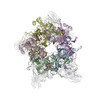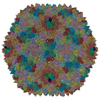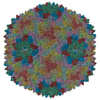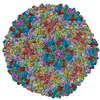[English] 日本語
 Yorodumi
Yorodumi- EMDB-6118: Electron cryo-microscopy of human papillomavirus 16 and H16.V5 Fa... -
+ Open data
Open data
- Basic information
Basic information
| Entry | Database: EMDB / ID: EMD-6118 | |||||||||
|---|---|---|---|---|---|---|---|---|---|---|
| Title | Electron cryo-microscopy of human papillomavirus 16 and H16.V5 Fab fragments | |||||||||
 Map data Map data | Reconstruction of mature human papillomavirus 16 capsid complexed with Fab fragments after 72 hr incubation | |||||||||
 Sample Sample |
| |||||||||
 Keywords Keywords | virus-Fab complex / neutralization antibody / maturation | |||||||||
| Biological species |   Mus musculus (house mouse) / Mus musculus (house mouse) /   Human papillomavirus 16 Human papillomavirus 16 | |||||||||
| Method |  single particle reconstruction / single particle reconstruction /  cryo EM / Resolution: 15.8 Å cryo EM / Resolution: 15.8 Å | |||||||||
 Authors Authors | Lee H / Brendle SA / Bywaters SM / Guan J / Ashley RE / Yoder JD / Makhov AM / Conway JF / Christensen ND / Hafenstein S | |||||||||
 Citation Citation |  Journal: J Virol / Year: 2015 Journal: J Virol / Year: 2015Title: A cryo-electron microscopy study identifies the complete H16.V5 epitope and reveals global conformational changes initiated by binding of the neutralizing antibody fragment. Authors: Hyunwook Lee / Sarah A Brendle / Stephanie M Bywaters / Jian Guan / Robert E Ashley / Joshua D Yoder / Alexander M Makhov / James F Conway / Neil D Christensen / Susan Hafenstein /  Abstract: Human papillomavirus 16 (HPV16) is a worldwide health threat and an etiologic agent of cervical cancer. To understand the antigenic properties of HPV16, we pursued a structural study to elucidate HPV ...Human papillomavirus 16 (HPV16) is a worldwide health threat and an etiologic agent of cervical cancer. To understand the antigenic properties of HPV16, we pursued a structural study to elucidate HPV capsids and antibody interactions. The cryo-electron microscopy (cryo-EM) structures of a mature HPV16 particle and an altered capsid particle were solved individually and as complexes with fragment of antibody (Fab) from the neutralizing antibody H16.V5. Fitted crystal structures provided a pseudoatomic model of the virus-Fab complex, which identified a precise footprint of H16.V5, including previously unrecognized residues. The altered-capsid-Fab complex map showed that binding of the Fab induced significant conformational changes that were not seen in the altered-capsid structure alone. These changes included more ordered surface loops, consolidated so-called "invading-arm" structures, and tighter intercapsomeric connections at the capsid floor. The H16.V5 Fab preferentially bound hexavalent capsomers likely with a stabilizing effect that directly correlated with the number of bound Fabs. Additional cryo-EM reconstructions of the virus-Fab complex for different incubation times and structural analysis provide a model for a hyperstabilization of the capsomer by H16.V5 Fab and showed that the Fab distinguishes subtle differences between antigenic sites. IMPORTANCE: Our analysis of the cryo-EM reconstructions of the HPV16 capsids and virus-Fab complexes has identified the entire HPV.V5 conformational epitope and demonstrated a detailed neutralization ...IMPORTANCE: Our analysis of the cryo-EM reconstructions of the HPV16 capsids and virus-Fab complexes has identified the entire HPV.V5 conformational epitope and demonstrated a detailed neutralization mechanism of this clinically important monoclonal antibody against HPV16. The Fab bound and ordered the apical loops of HPV16. This conformational change was transmitted to the lower region of the capsomer, resulting in enhanced intercapsomeric interactions evidenced by the more ordered capsid floor and "invading-arm" structures. This study advances the understanding of the neutralization mechanism used by H16.V5. | |||||||||
| History |
|
- Structure visualization
Structure visualization
| Movie |
 Movie viewer Movie viewer |
|---|---|
| Structure viewer | EM map:  SurfView SurfView Molmil Molmil Jmol/JSmol Jmol/JSmol |
| Supplemental images |
- Downloads & links
Downloads & links
-EMDB archive
| Map data |  emd_6118.map.gz emd_6118.map.gz | 45 MB |  EMDB map data format EMDB map data format | |
|---|---|---|---|---|
| Header (meta data) |  emd-6118-v30.xml emd-6118-v30.xml emd-6118.xml emd-6118.xml | 11.3 KB 11.3 KB | Display Display |  EMDB header EMDB header |
| Images |  400_6118.gif 400_6118.gif 80_6118.gif 80_6118.gif | 80.4 KB 6.1 KB | ||
| Archive directory |  http://ftp.pdbj.org/pub/emdb/structures/EMD-6118 http://ftp.pdbj.org/pub/emdb/structures/EMD-6118 ftp://ftp.pdbj.org/pub/emdb/structures/EMD-6118 ftp://ftp.pdbj.org/pub/emdb/structures/EMD-6118 | HTTPS FTP |
-Related structure data
| Related structure data |  5991C  5992C  5993C  5994C  6119C  3j7eC  3j7gC C: citing same article ( |
|---|---|
| Similar structure data |
- Links
Links
| EMDB pages |  EMDB (EBI/PDBe) / EMDB (EBI/PDBe) /  EMDataResource EMDataResource |
|---|
- Map
Map
| File |  Download / File: emd_6118.map.gz / Format: CCP4 / Size: 112.1 MB / Type: IMAGE STORED AS FLOATING POINT NUMBER (4 BYTES) Download / File: emd_6118.map.gz / Format: CCP4 / Size: 112.1 MB / Type: IMAGE STORED AS FLOATING POINT NUMBER (4 BYTES) | ||||||||||||||||||||||||||||||||||||||||||||||||||||||||||||
|---|---|---|---|---|---|---|---|---|---|---|---|---|---|---|---|---|---|---|---|---|---|---|---|---|---|---|---|---|---|---|---|---|---|---|---|---|---|---|---|---|---|---|---|---|---|---|---|---|---|---|---|---|---|---|---|---|---|---|---|---|---|
| Annotation | Reconstruction of mature human papillomavirus 16 capsid complexed with Fab fragments after 72 hr incubation | ||||||||||||||||||||||||||||||||||||||||||||||||||||||||||||
| Voxel size | X=Y=Z: 2.86 Å | ||||||||||||||||||||||||||||||||||||||||||||||||||||||||||||
| Density |
| ||||||||||||||||||||||||||||||||||||||||||||||||||||||||||||
| Symmetry | Space group: 1 | ||||||||||||||||||||||||||||||||||||||||||||||||||||||||||||
| Details | EMDB XML:
CCP4 map header:
| ||||||||||||||||||||||||||||||||||||||||||||||||||||||||||||
-Supplemental data
- Sample components
Sample components
-Entire : Mature HPV16 quasivirus capsid complexed with H16.V5 Fabs
| Entire | Name: Mature HPV16 quasivirus capsid complexed with H16.V5 Fabs |
|---|---|
| Components |
|
-Supramolecule #1000: Mature HPV16 quasivirus capsid complexed with H16.V5 Fabs
| Supramolecule | Name: Mature HPV16 quasivirus capsid complexed with H16.V5 Fabs type: sample / ID: 1000 Oligomeric state: Three hundred H16.V5 Fabs bind to one HPV16 capsid Number unique components: 2 |
|---|---|
| Molecular weight | Theoretical: 42 MDa |
-Supramolecule #1: Human papillomavirus 16
| Supramolecule | Name: Human papillomavirus 16 / type: virus / ID: 1 Details: The virus sample was incubated with excessive Fab fragments for 72 hrs. NCBI-ID: 337041 / Sci species name: Human papillomavirus 16 / Database: NCBI / Virus type: VIRION / Virus isolate: OTHER / Virus enveloped: No / Virus empty: No |
|---|---|
| Host (natural) | Organism:   Homo sapiens (human) / synonym: VERTEBRATES Homo sapiens (human) / synonym: VERTEBRATES |
| Molecular weight | Theoretical: 27 MDa |
| Virus shell | Shell ID: 1 / Name: L1/L2 / Diameter: 600 Å / T number (triangulation number): 7 |
-Macromolecule #1: H16.V5 Fab
| Macromolecule | Name: H16.V5 Fab / type: protein_or_peptide / ID: 1 / Number of copies: 300 / Oligomeric state: monomer / Recombinant expression: No / Database: NCBI |
|---|---|
| Source (natural) | Organism:   Mus musculus (house mouse) / Cell: hybridoma Mus musculus (house mouse) / Cell: hybridoma |
| Molecular weight | Theoretical: 50 KDa |
-Experimental details
-Structure determination
| Method |  cryo EM cryo EM |
|---|---|
 Processing Processing |  single particle reconstruction single particle reconstruction |
| Aggregation state | particle |
- Sample preparation
Sample preparation
| Concentration | 1.0 mg/mL |
|---|---|
| Buffer | pH: 7.4 Details: 137 mM NaCl, 2.7 mM KCl, 10 mM Na2HPO4, 1.8 mM KH2PO4 |
| Grid | Details: glow-discharged holey carbon Quantifoil grids |
| Vitrification | Cryogen name: ETHANE / Chamber humidity: 90 % / Chamber temperature: 102 K / Instrument: GATAN CRYOPLUNGE 3 / Method: Blot for 0.7 seconds before plunging. |
- Electron microscopy
Electron microscopy
| Microscope | JEOL 2100 |
|---|---|
| Electron beam | Acceleration voltage: 200 kV / Electron source: LAB6 |
| Electron optics | Illumination mode: SPOT SCAN / Imaging mode: BRIGHT FIELD Bright-field microscopy / Cs: 2 mm / Nominal defocus max: 5.18 µm / Nominal defocus min: 1.63 µm / Nominal magnification: 40000 Bright-field microscopy / Cs: 2 mm / Nominal defocus max: 5.18 µm / Nominal defocus min: 1.63 µm / Nominal magnification: 40000 |
| Sample stage | Specimen holder model: GATAN LIQUID NITROGEN |
| Temperature | Average: 95 K |
| Date | Aug 18, 2014 |
| Image recording | Category: CCD / Film or detector model: GATAN ULTRASCAN 4000 (4k x 4k) / Number real images: 102 / Average electron dose: 15 e/Å2 |
- Image processing
Image processing
| CTF correction | Details: Each particle |
|---|---|
| Final reconstruction | Algorithm: OTHER / Resolution.type: BY AUTHOR / Resolution: 15.8 Å / Resolution method: OTHER / Software - Name: Auto3dem Details: Semi-automatic particle selection was performed using e2boxer.py to obtain the particle coordinates, followed by particle boxing, linearization, normalization, and apodization of the images ...Details: Semi-automatic particle selection was performed using e2boxer.py to obtain the particle coordinates, followed by particle boxing, linearization, normalization, and apodization of the images using Robem. Defocus and astigmatism values to perform contrast transfer function (CTF) correction were assessed using Robem for the extracted particles. The icosahedrally averaged reconstructions were initiated using a random model generated with setup_rmc and reached 14 A resolution estimated at a Fourier Shell Correlation (FSC) of 0.5. For the last step of refinement, the final maps were CTF-corrected using a B factor of 200 A2. Number images used: 2075 |
| Details | The particles were selected using semi-automatic program e2boxer.py (EMAN2). |
 Movie
Movie Controller
Controller












